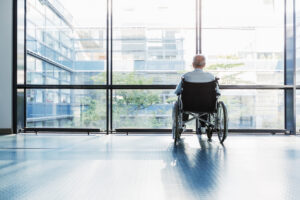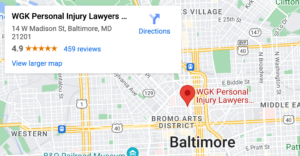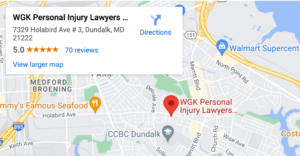
If your family member is living in a nursing home or assisted living facility in Baltimore, MD, you want them to feel at home and receive a level of care that keeps them safe, healthy, and happy.
Sadly, many people in long-term care facilities suffer various forms of nursing home abuse, including being deprived of basic needs like proper nutrition and hydration.
Elderly people are more susceptible to malnutrition or dehydration for a number of reasons, but trained staff can and should prevent it.
Our Baltimore dehydration lawyers work to hold nursing home staff and facilities accountable when they cause harm to residents who count on them for care.
WGK Personal Injury Lawyers is a family firm with three generations of lawyers, and we’ve been fighting for the rights of injured victims since 1977. We’ve recovered tens of millions of dollars in settlements and verdicts for those suffering due to the negligence of others. We’d be honored to stand up for your family. Contact us today for a free and completely confidential consultation at (410) 837-2144.
Table of Contents
How Can WGK Personal Injury Lawyers Help With a Dehydration Injury in Baltimore?

It’s devastating to learn that your loved one is being neglected or abused, especially by trained professionals entrusted with their care. Our Baltimore nursing home abuse lawyers can help you through this difficult and emotional time by:
- Monitoring agency investigations
- Providing support, guidance, and legal options to help your loved one get the care they need, including transfer to another facility
- Determine all factors that led to your loved one becoming dehydrated and whether other abuse has occurred at the facility
- Seek damages that cover the full value of your loved one’s losses
- File all claims or lawsuits necessary to hold the individuals or facility accountable and get the compensation your loved one deserves
We have more than a century of combined legal experience that allows us to successfully handle the most complex and hard-fought cases. Call our Baltimore, Maryland, law office today for a free case evaluation.
What Is Dehydration and What Injuries Does It Cause?
Dehydration occurs when your body takes in less liquid than it loses. If you don’t replenish your body with liquids, dehydration can cause serious injury or death. Anyone can get dehydrated during strenuous exercise or in extreme heat, but dehydration can be a sign of nursing home neglect.
Some complications caused by dehydration include:
- Kidney failure
- Urinary tract infections
- Choking
- Coma
- Brain damage
- Heat stroke
- Damage to the cardiovascular system
- Seizures
- Cerebral edema
- Wrongful death
The signs of dehydration aren’t always easy to recognize. When care facilities are understaffed or fail to train their staff, the chances of spotting and treating dehydration before it causes harm are slim.
What Are the Signs of Dehydration?
Staff at long-term care facilities should be trained to look for signs of dehydration because older adults may not remember to drink enough water and may refuse water or food for other reasons.
Some common symptoms of dehydration are:
- Dry mouth, skin, or eyes
- Infrequent urination
- Dark urine
- Low blood pressure
- Dizziness or lightheadedness
- Confusion
- Muscle cramps
- Sunken cheeks or eyes
- Headache
- Lack of sweat
Older adults may have other health conditions that could easily be made worse by the effects of dehydration or malnutrition.
Why Do So Many Nursing Home Residents Suffer From Dehydration?
One study indicates at least one in three nursing home residents suffers from dehydration or malnutrition. A major factor? Lack of training. While there are certainly natural causes of depleted fluids, when it occurs in a managed care facility, dehydration should be detected and remedied immediately.
In addition to inadequate training, other reasons dehydration occurs in nursing homes and assisted living facilities include:
- Understaffing
- High staff turnover
- Failure to develop and implement organizational procedures
- Medication errors
When facilities are understaffed, nursing aides are forced to monitor many more residents than they can properly care for. There are many reasons residents in assisted living facilities or nursing homes risk becoming dehydrated and may require a higher level of monitoring, such as:
- They may have cognitive impairments that make it difficult for them to recognize when they need to drink.
- They may have difficulty speaking or suffer from depression and find it more difficult to ask for help.
- They may take medications or suffer from conditions like dysphagia that make them more susceptible to dehydration.
- A decline in muscle mass and kidney function in older adults affects their ability to retain liquids.
Staff should be trained on how to spot early signs and which patients may need extra monitoring.
Who Is Liable for Nursing Home Dehydration Injuries?
It all depends on the circumstances. Potentially liable parties could include:
- Nurses or nursing assistants
- Other staff members
- Doctors
- Nursing home or long-term care facility
We work diligently to identify all parties involved in harming your loved one. When a care facility is neglecting or abusing its residents, it must be held accountable.
Schedule a Free Consultation With Our Baltimore Dehydration Lawyers
Is your loved one suffering from dehydration and nursing home neglect? WGK Personal Injury Lawyers is ready to help. We treat your case with the care, compassion, and respect it deserves. Our three generations of Baltimore dehydration lawyers have successfully recovered tens of millions of dollars for injury victims over the years.
Let us help protect your family. Call now for a free consultation.


